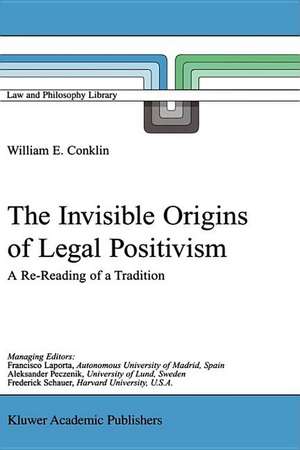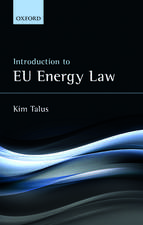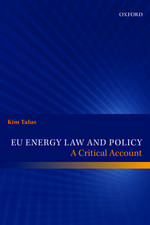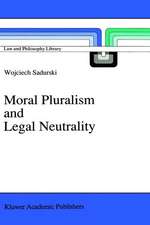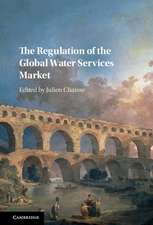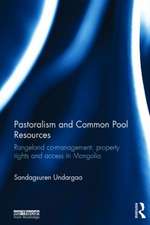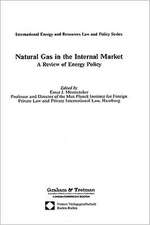The Invisible Origins of Legal Positivism: A Re-Reading of a Tradition: Law and Philosophy Library, cartea 52
Autor W.E. Conklinen Limba Engleză Hardback – 31 aug 2001
What is this authorising origin? Different forms include an originary author, an a priori concept, and an immediacy of bonding between person and laws. In each case the origin is unwritten in the sense of being inaccessible to the authoritative texts written by the officials of civil institutions of the sovereign state.
Conklin sets his thesis in the context of the legal theory of the polis and the pre-polis of Greek tribes. The author claims that the problem is that the tradition of legal positivism of a modern sovereign state excises the experiential, or bodily, meanings from the written language of the posited rules/norms, thereby forgetting the very pre-legal authorising origin of the posited norms that each philosopher admits as offering the finality that legal reasoning demands if it is to be authoritative.
| Toate formatele și edițiile | Preț | Express |
|---|---|---|
| Paperback (1) | 643.84 lei 6-8 săpt. | |
| SPRINGER NETHERLANDS – 30 noi 2001 | 643.84 lei 6-8 săpt. | |
| Hardback (1) | 651.19 lei 6-8 săpt. | |
| SPRINGER NETHERLANDS – 31 aug 2001 | 651.19 lei 6-8 săpt. |
Din seria Law and Philosophy Library
- 20%
 Preț: 813.10 lei
Preț: 813.10 lei - 20%
 Preț: 569.00 lei
Preț: 569.00 lei - 18%
 Preț: 1225.16 lei
Preț: 1225.16 lei - 18%
 Preț: 950.66 lei
Preț: 950.66 lei - 15%
 Preț: 583.43 lei
Preț: 583.43 lei - 15%
 Preț: 639.25 lei
Preț: 639.25 lei - 15%
 Preț: 641.53 lei
Preț: 641.53 lei - 18%
 Preț: 893.84 lei
Preț: 893.84 lei - 24%
 Preț: 797.37 lei
Preț: 797.37 lei - 15%
 Preț: 579.84 lei
Preț: 579.84 lei - 15%
 Preț: 644.95 lei
Preț: 644.95 lei - 18%
 Preț: 895.76 lei
Preț: 895.76 lei - 15%
 Preț: 644.95 lei
Preț: 644.95 lei - 20%
 Preț: 571.84 lei
Preț: 571.84 lei - 15%
 Preț: 642.03 lei
Preț: 642.03 lei - 18%
 Preț: 1232.26 lei
Preț: 1232.26 lei - 18%
 Preț: 1116.05 lei
Preț: 1116.05 lei - 15%
 Preț: 655.92 lei
Preț: 655.92 lei - 18%
 Preț: 833.54 lei
Preț: 833.54 lei - 18%
 Preț: 898.26 lei
Preț: 898.26 lei - 18%
 Preț: 1016.63 lei
Preț: 1016.63 lei -
 Preț: 390.25 lei
Preț: 390.25 lei - 24%
 Preț: 700.88 lei
Preț: 700.88 lei - 18%
 Preț: 999.60 lei
Preț: 999.60 lei - 18%
 Preț: 1115.77 lei
Preț: 1115.77 lei - 18%
 Preț: 1107.88 lei
Preț: 1107.88 lei - 15%
 Preț: 637.46 lei
Preț: 637.46 lei - 18%
 Preț: 781.94 lei
Preț: 781.94 lei - 24%
 Preț: 815.51 lei
Preț: 815.51 lei - 18%
 Preț: 786.18 lei
Preț: 786.18 lei - 18%
 Preț: 735.21 lei
Preț: 735.21 lei - 15%
 Preț: 653.33 lei
Preț: 653.33 lei - 18%
 Preț: 782.10 lei
Preț: 782.10 lei
Preț: 651.19 lei
Preț vechi: 766.10 lei
-15% Nou
Puncte Express: 977
Preț estimativ în valută:
124.60€ • 130.45$ • 103.10£
124.60€ • 130.45$ • 103.10£
Carte tipărită la comandă
Livrare economică 05-19 aprilie
Preluare comenzi: 021 569.72.76
Specificații
ISBN-13: 9780792371014
ISBN-10: 0792371011
Pagini: 350
Ilustrații: XI, 350 p.
Dimensiuni: 155 x 235 x 25 mm
Greutate: 0.72 kg
Ediția:2001
Editura: SPRINGER NETHERLANDS
Colecția Springer
Seria Law and Philosophy Library
Locul publicării:Dordrecht, Netherlands
ISBN-10: 0792371011
Pagini: 350
Ilustrații: XI, 350 p.
Dimensiuni: 155 x 235 x 25 mm
Greutate: 0.72 kg
Ediția:2001
Editura: SPRINGER NETHERLANDS
Colecția Springer
Seria Law and Philosophy Library
Locul publicării:Dordrecht, Netherlands
Public țintă
ResearchCuprins
One: The Positive Law/Natural Law Dichotomy, Aristotle and the Greek Totemic Culture.- 1. The Rise of the Positive Law – Natural Law Dichotomy.- 2. The Constraint of the Positive Law – Natural Law Dichotomy.- 3. The Determinative Sense of Natural Laws.- 4. The Exclusionary Character of the Nomos/Physis Dichotomy.- 5. The Figurative Sense of Natural Laws.- 6. The Laws of the Totemic Culture.- 7. The Positive Law – Natural Law Dichotomy as Suspect.- Two: Invisibility in Modern Legal Thought.- 1. The Invisible Author.- 2. The Invisible as an Inaccessible Immediacy.- 3. The Invisible as an a priori Concept.- 4. The Invisibility of the Absent Origin.- Three: The Tradition of Legal Positivism in Modern Legal Thought.- 1. The Impersonality of Posited Laws.- 2. Is there a Tradition of Legal Positivism?.- 3. Three Inquiries.- 4. The Authorizing Origin of Posited Rules/Norms.- 5. The Problematic of Modem Legal Positivism.- Four: An Invisible Nature: The Origin of Thomas Hobbes’s Civil Laws.- 1. The Parado.- 2. Why is Language Important?.- 3. Nature as a Condition lacking a Shared Language.- 4. The Actors of a Language.- 5. The Problematic of Hobbes’ Theory of Sovereignty.- 6. The Natural Condition.- 7. The Authority of Written Laws.- 8. Legal Obligation.- 9. The Mythology of Legal Authority.- 10. The Invisible Origin of the Authority of Hobbes’ Civil Laws.- 11. The Forgotten Origin.- Five: Naming the Unnamable: Jean-Jacques Rousseau’s General Will.- 1. The Author as the General Will.- 2. The Legislature.- 3. Civil Laws as the Expression of the general will.- 4. Naming the Unnamable.- Six: The Habits of the People: The Origin of John Austin’s Laws Properly So Called.- 1. The Problematic of Austin’s Theory of Law.- 2. Austin’s Commentators.- 3. The Excise of theNatural Condition from Civil Society.- 4. The Historical Author.- 5. Is the Historical Author’s Authority Unlimited?.- 6. The Inaccessibility of the Will of the People.- 7. Austin’s Inaccessible Arche.- 8. Who are `the People’?.- 9. The Spirit of `the People’.- Seven: The Invisible Origin of Legal Language: The Grundnorm.- 1. The Impure Origin of the Structure.- 2. An Hypothetical or a Catogorical Origin?.- 3. The Origin as an a priori Concept.- 4. The Invisible Origin of the Authority of Norms.- IChapter Eight: The Forgotten Origin: H.L.A. Hart’s Sense of the Pre-Legal.- 1. The Rule of Recognition.- 2. The Immediacy and the Statement.- 3. Examples of Hart’s Distinction between Immediacy and Legal Statements.- 4. Does the Authorizing Origin Pre-exist Primary Rules?.- 5. Is the Authorizing Origin Internal to the Primary and Secondary Rules?.- 6. Is the Authorizing Origin Accessible to Legal Officials?.- 7. The Forgotten Origin.- Nine: Forgetting the Act of Forgetting: Raz’s Inaccessible Origin of Legal Reasoning.- 1. Experiential Bonding as the Origin of the Legal Structure.- 2. The Official’s Forgetting of the Experiential Origin.- 3. The Legal Point of View.- 4. The Unwritten Experiential Beliefs.- 5. The Language of the Legal Point of View.- 6. Violence and the Constitution of the Institutions.- 7. The Idealism of Raz’s Legal Reasoning.- 8. Forgetting the Act of Forgetting.- Conclusion: The End of Legal Positivism.- 1. The Finality of the Trace of Auctoritas.- 2. The Invisible Origin.- 3. The Violence of the Juridical Production of the Origin.- 4. The Contradiction.- 5. Forgetting the Origin.- 6. The Crisis.- 7. The End of a Tradition.- 1. Primary Sources.- 2. Secondary Sources.
